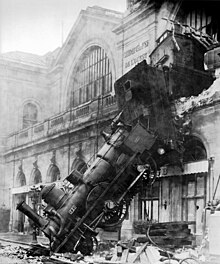train wreck
Jump to navigation
Jump to search
See also: trainwreck and train-wreck
English
[edit]
Alternative forms
[edit]- trainwreck
- train-wreck (dated)
Noun
[edit]train wreck (plural train wrecks)
- The aftermath of a train crash.
- Synonyms: (hobo slang) prairie meet, (railroad jargon) cornfield meet
- (figurative) A disaster, especially one which is large, chaotic, and readily seen by public observers.
- Synonyms: catastrophe, car crash, car wreck
- 1986 September 1, Hugh Sidey, “The Presidency: Colliding with Realities”, in Time[1], archived from the original on 2008-12-21:
- There is a feeling in Washington that we are gathering at the side of the track to watch a gigantic economic train wreck one of these days.
- 2009, Matthue Roth, Never Mind The Goldbergs:
- “Hrmm. I see your stylist's been working nights.” He surveyed the train wreck of my hair in the rearview mirror.
- (figurative) Someone (especially a woman) who is unbalanced and considered a mess, a disaster, one who is suffering personal ruin.
- 2007, Donna Hogan, “blurb”, in Train Wreck: The Life and Death of Anna Nicole Smith, Phoenix Books Incorporated, →ISBN:
- She may have been a train wreck, but she was a train wreck people still can't seem to get enough of. The sordid but fascinating story of her vicious, no-holds-barred battle with life is one of the most gripping, sex-soaked biographies in years.
- 2016, Sady Doyle, Trainwreck, page 24:
- […] women, by and large, do not like themselves very much: their ambition gaps, their orgasm gaps, their imposter syndrome, […] their trainwrecks, and their need for trainwrecks; the enduring, self-loathing need to find someone about whom they can say well, at least I'm not that girl.
Usage notes
[edit]- In the UK, train crash is preferred for the literal sense, and car crash is more common but not exclusively used for the metaphorical sense.
Translations
[edit]wreckage of a train crash
|
disaster
|
Verb
[edit]train wreck (third-person singular simple present train wrecks, present participle train wrecking, simple past and past participle train wrecked)
- To ruin utterly and catastrophically, to cause to end in disaster.
- 2003, Peter A. Laporta,, Ignite the Passion, AuthorHouse, →ISBN, page 57:
- […] basic fundamental communication steps must be achieved so not to train wreck the new employee.
- 2011, Jaden Lane, If You Could Read My Mind, Xlibris Corporation, →ISBN, page 157:
- "I want this, too, I want you. Like really want you more than anything I've wanted in a long time. But if you force it, you're going to train wreck the whole thing in a fiery mess over a steep cliff with jagged rocks below."
- For more quotations using this term, see Citations:trainwreck.
See also
[edit]References
[edit]- train wreck (slang): When the parts in an ensemble "collide" because the musicians are not playing together. Hal Leonard Pocket Music Dictionary, p. 122.
- Train wreck: in jazz, when everything comes off the rails - someone misses a repeat, skips the bridge, and so on. Dolmetsch Online.
Further reading
[edit] train wreck on Wikipedia.Wikipedia
train wreck on Wikipedia.Wikipedia - “train wreck”, in Lexico, Dictionary.com; Oxford University Press, 2019–2022.